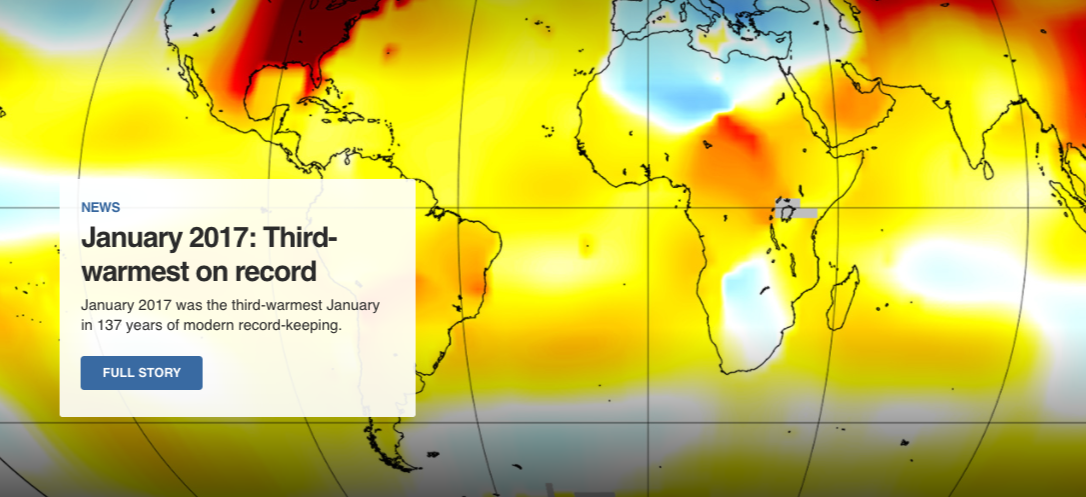

For years, Republican lawmakers have
tried to scrap NASA‘s climate change research in favor of space exploration, but with President Trump and his cabinet of climate skeptics now in control, the space agency’s earth sciences budget could finally be on the chopping block.
Rep.
Lamar Smith (R-Texas), the notoriously science-averse chairman of the House Committee on Science, Space and Technology, told E&E News he wants a “rebalancing” of NASA’s mission.
https://twitter.com/NASAClimate/status/832299719544016897
“By rebalancing, I’d like for more funds to go into space exploration; we’re not going to zero out earth sciences,” he said. “Our weather satellites have been an immense help, for example, and that’s from NASA, but I’d like for us to remember what our priorities are, and there are another dozen agencies that study earth science and climate change, and they can continue to do that. Meanwhile, we only have one agency that engages in space exploration, and they need every dollar they can muster for space exploration.”
That means NASA’s work on climate change could go to another agency, with or without funding, or possibly get cut, E&E News explained. Smith and other Republicans acknowledged that significant changes to NASA’s earth sciences program could be introduced in the near future.
Rep. Jim Bridenstine (R-Okla.), who is running for NASA administrator, told E&E News that he was not committed to keeping climate research at NASA but may be open to transferring the program to the National Oceanic and Atmospheric Administration (NOAA).
https://twitter.com/EcoWatch/status/802129772671332352
But ProPublica senior reporter Andrew Revkin in an interview with
NPR said that NOAA might not be as well equipped to study climate change.
“If they say—well, we’re just going to shift [climate science] over to, let’s say, NOAA, the oceanic and atmospheric administration, that doesn’t really work well because NOAA doesn’t necessarily have the skill sets to do some of the work that would be easier done at NASA,” he added.
Additionally, he highlighted how one of biggest proponents of scrapping NASA’s climate science program is actually a lobbyist for rocket companies.
“There was someone who was part of the Trump campaign who was pushing for, you know, moving all this climate science out of NASA—that doesn’t need to happen there—and making sure NASA’s focused on its missions to other planets and back to the moon or that kind of thing,” Revkin said. “And of course, he is a lobbyist for companies that build rockets and stuff then.”
The GOP has previously waged war with NASA’s research on our home planet. In
2015 and in 2016, Congressional Republicans sought deep cuts to climate research while favoring space exploration instead.
Former Republican Rep. Bob Walker, who is a senior Trump advisor has been actively involved in deliberating the administration’s space policy. Walker told the Guardian in November that NASA’s earth science program amounts to “politically correct environmental monitoring.”
“We see NASA in an exploration role, in deep space research,” he added. “Earth-centric science is better placed at other agencies where it is their prime mission.”
There are many reasons why de-funding NASA’s climate change science would be a major mistake. As James Dyke at The Conversation pointed out, NASA organizations such as the Goddard Institute for Space Studies and Jet Propulsion Laboratory have made significant contributions to our understanding of how humans are changing the Earth’s climate.
https://twitter.com/EcoWatch/status/803294278499717121
NASA also has more than a dozen satellites that
orbit the Earth and remotely sense ocean, land and atmospheric conditions. Its research encompasses solar activity, sea level rise, the temperature of the atmosphere and the oceans, the ozone layer, air pollution, and changes in sea and land ice.
Despite the Republicans and the Trump administration’s seemingly hostile feelings about the established science of climate change, NASA has been frequently posting tweets about the topic on its Twitter page.
[facebook https://facebook.com/EcoWatch/videos/1460041177342148/ expand=1]

 233k
233k  41k
41k  Subscribe
Subscribe 